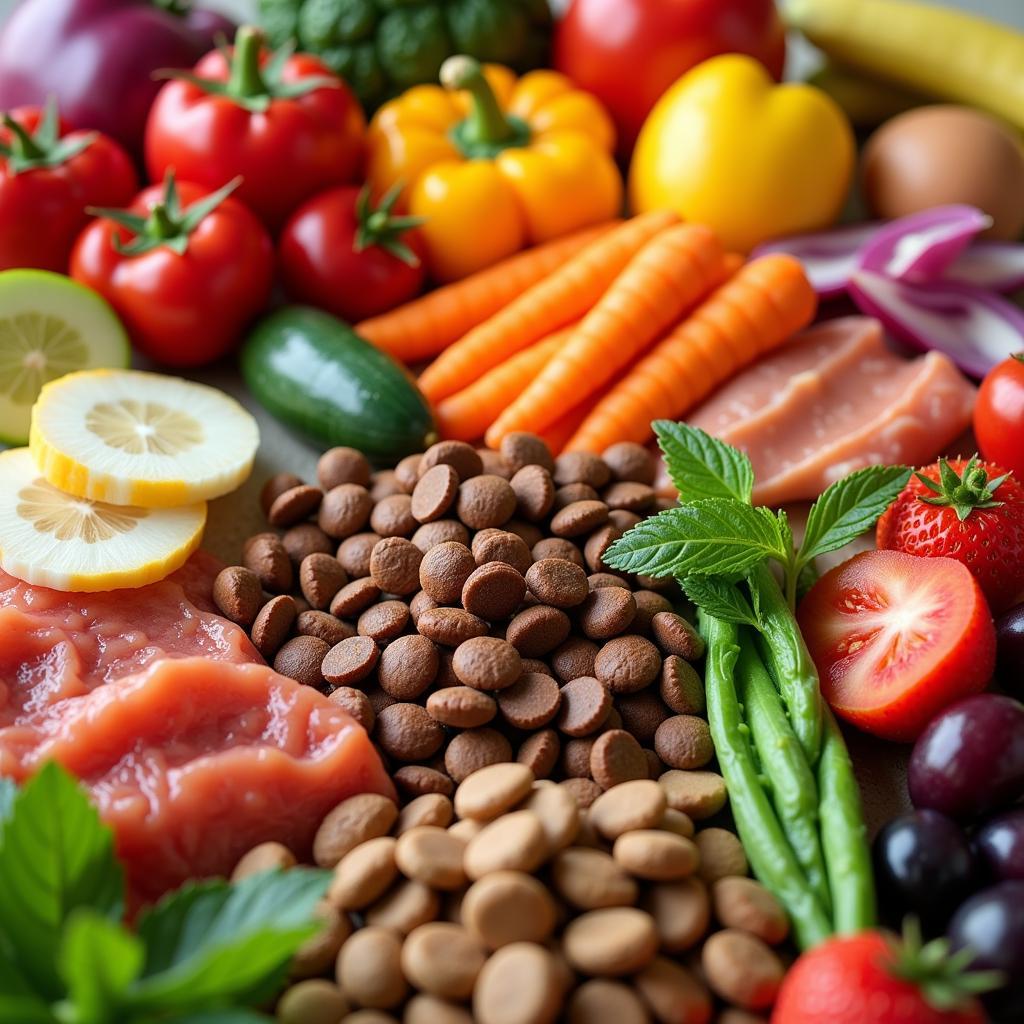Choosing the right food for your furry friend is one of the most important decisions you’ll make as a dog owner. Just like humans, dogs thrive on a balanced and nutritious diet. But with countless dog food brands and formulas flooding the market, finding the Optimum Dog Food for your canine companion can feel like navigating a labyrinth. Fear not, fellow dog lovers! This comprehensive guide will equip you with the knowledge to make informed choices, ensuring your four-legged family member enjoys a long, healthy, and tail-waggingly happy life.
 A Close-Up of Premium Dog Food Ingredients
A Close-Up of Premium Dog Food Ingredients
Decoding the Dog Food Label: A Crucial First Step
Before we delve into the specifics of optimum dog food, let’s equip you with the tools to decipher those often-confusing dog food labels. Remember, the information provided on the packaging is your window into the nutritional composition of the food you’re considering.
- Guaranteed Analysis: This section outlines the minimum percentages of crude protein, fat, fiber, and moisture present in the food. It’s important to note that these figures are not necessarily indicative of digestibility or the actual amount of nutrients your dog will absorb.
- Ingredient List: This is where the detective work begins! Ingredients are listed in descending order by weight. Look for whole meat sources, such as chicken, beef, or fish, as the primary ingredient. Avoid foods that list by-products, fillers (like corn, wheat, and soy), or artificial additives as primary ingredients.
- Life Stage: Dog food formulas are often tailored to specific life stages, such as puppy, adult, senior, or all life stages. Puppies, with their rapid growth and development, require higher calorie and nutrient content compared to adult dogs. Senior dog food, on the other hand, may contain ingredients that support joint health and cognitive function.
- AAFCO Statement: The Association of American Feed Control Officials (AAFCO) sets nutritional standards for pet food. Look for the AAFCO statement on the packaging, which indicates whether the food meets the minimum requirements for a “complete and balanced” diet.
What Constitutes Optimum Dog Food?
Optimum dog food goes beyond simply meeting basic nutritional requirements. It focuses on providing a species-appropriate diet that supports your dog’s overall health and well-being. Here are the key elements to look for:
- High-Quality Protein Sources: Protein is essential for building and maintaining muscle mass, supporting a healthy immune system, and providing energy. Opt for foods that list whole meat sources, such as chicken, fish, beef, or lamb, as the primary ingredient.
- Healthy Fats: While often demonized, fats are a crucial source of energy for dogs and play a vital role in nutrient absorption. Look for healthy fats like those found in fish oil (rich in omega-3 fatty acids), chicken fat, or flaxseed oil.
- Digestible Carbohydrates: While dogs don’t require carbohydrates to the same extent as humans, they can provide a valuable source of energy. Choose dog foods that incorporate highly digestible carbohydrates like brown rice, sweet potatoes, or oats. Avoid fillers like corn, wheat, and soy, which can be difficult for dogs to digest and may trigger allergies.
- Essential Vitamins and Minerals: Vitamins and minerals are essential for various bodily functions, from maintaining healthy skin and coat to supporting immune function and bone health. Look for foods fortified with a balanced blend of essential vitamins and minerals.
Tailoring Your Choice: Factors to Consider
Choosing optimum dog food isn’t a one-size-fits-all approach. Just like humans, individual dogs have unique nutritional needs based on factors like:
- Breed: Certain breeds are predisposed to specific health conditions, which may influence dietary choices. For example, large breed dogs are prone to joint problems, so choosing a food that supports joint health is crucial.
- Age: As mentioned earlier, puppies, adult dogs, and senior dogs have varying nutritional requirements.
- Activity Level: A highly active dog will require a higher calorie diet compared to a more sedentary canine companion.
- Health Conditions: If your dog has any underlying health conditions, such as allergies, sensitivities, or digestive issues, you’ll need to choose a food that addresses those specific needs.
 Comparing Different Types of Dog Food
Comparing Different Types of Dog Food
Transitioning to a New Dog Food: A Gradual Approach
Once you’ve chosen the optimum dog food for your furry friend, it’s essential to transition gradually to avoid digestive upset. Start by mixing a small amount of the new food with your dog’s current food, gradually increasing the ratio of new food to old food over 7-10 days.
Beyond Nutrition: Other Essential Considerations
- Fresh Water: Always ensure your dog has access to fresh, clean water.
- Treats: While treats can be a valuable training tool and a way to show your furry friend some love, moderation is key. Choose healthy, low-calorie treat options and factor them into your dog’s daily caloric intake.
- Regular Veterinary Checkups: Regular veterinary checkups are essential for monitoring your dog’s overall health, including weight management and early detection of any potential issues.
FAQs: Answering Your Burning Questions
Q1: Is grain-free dog food always the best choice?
While grain-free dog food has gained popularity in recent years, it’s not necessarily the best option for every dog. Some dogs may thrive on a grain-free diet, while others may experience digestive issues or nutrient deficiencies.
Q2: What about raw food diets?
Raw food diets can be nutritionally balanced, but they also carry a higher risk of bacterial contamination. If you’re considering a raw food diet for your dog, consult with your veterinarian to ensure it’s the right choice and that you’re following safe handling practices.
Q3: How can I tell if my dog has a food allergy?
Food allergies in dogs can manifest as skin problems (itching, scratching, hair loss), gastrointestinal issues (vomiting, diarrhea), or ear infections. If you suspect your dog has a food allergy, consult with your veterinarian for proper diagnosis and treatment.
Optimum Dog Food: A Lifelong Investment
Choosing the optimum dog food for your furry companion is a lifelong journey of love and care. By arming yourself with knowledge and prioritizing your dog’s nutritional needs, you’re making a profound investment in their long-term health and happiness.
 A Happy Dog Enjoying a Meal
A Happy Dog Enjoying a Meal
Remember, we’re here to support you every step of the way. For personalized guidance on choosing the best dog food for your furry friend, contact our team at Phone Number: 02437655121, Email: [email protected] Or visit us at: 3PGH+8R9, ĐT70A, thôn Trung, Bắc Từ Liêm, Hà Nội, Việt Nam. We have a 24/7 customer support team.
Don’t forget to explore our article on optimum cat food for insights into providing the best nutrition for your feline companions!